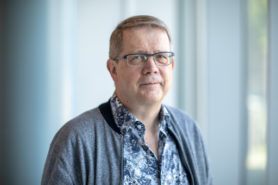News
Why Ferdi Engels would want all teachers to have a TLL
 Prof. Dr. Ferdi Engels is a lecturer at Pharmaceutical Sciences and director of the Undergraduate School of Science at Utrecht University, and he is also coordinator of the Higher Education activities of the Teaching & Learning Lab (TLL). But what does he find so special about the TLL, and why would he want all teachers to have a TLL? You can read it in this interview with Ferdi Engels!
Prof. Dr. Ferdi Engels is a lecturer at Pharmaceutical Sciences and director of the Undergraduate School of Science at Utrecht University, and he is also coordinator of the Higher Education activities of the Teaching & Learning Lab (TLL). But what does he find so special about the TLL, and why would he want all teachers to have a TLL? You can read it in this interview with Ferdi Engels!
Why did you start working in education?
“Working in education is fascinating. I am very interested in didactics, in addition to my own field of pharmacology. The combination of content (what?) and educational form (how?) continues to fascinate me. I am also very grateful that I can try things out in education, investigate what works and what doesn’t. Sometimes something goes wrong and you feel a bit bad, but it does not outweigh the butterflies in your stomach (yes, yes!) when you try something new. ”
What do you think of the TLL idea; a physical test location for educational innovation and learning effect measurement?
“You can find ideas for innovations in education everywhere: talking to students and colleagues, reading the scientific literature, while cycling to work in the morning, and even in the shower. Often ideas remain ideas. That is because you cannot simply try out those ideas in the regular educational environment. The TLL offers a unique place to try out and further develop those ideas. Because of the flexible layout of the TLL, you will also get new ideas there. I actually see the TLL as a flywheel: it helps you to initiate educational innovations, but also to keep them going. ”
What do you find innovative about the TLL?
“Utrecht University is increasingly focusing on alternative arrangements for classrooms. An example is the Active Learning Classroom (ALC) at the Bolognalaan. The TLL is, as it were, the breeding ground for such developments. In the TLL, ideas are explored, worked out and researched, after which the experiences are incorporated into university policy on classrooms and other facilities. ”
In your opinion, how can the TLL contribute to the quality of education?
“The ‘profit’ of the TLL is not only to be found in new developments in classrooms and facilities, but also in the development of teachers. As a teacher in the TLL you have the opportunity to think about the didactic approach of your education and you are stimulated to investigate what works. We are talking about ‘scholarly teaching’ and ‘scholarship of teaching and learning’ (SoTL), where the TLL can play a supporting role. I would like to refer interested parties to an article by Potter and Kustra from 2011. In my opinion, scholarly teaching and SoTL make an important contribution to the development of teachers and thus directly to the quality of education. ”
What do you yourself do in the TLL, and what else would you like to do in the TLL?
“I am very interested in various forms of collaborative learning. For me, the TLL is a kind of laboratory in which I test and observe this.
We are currently working on a project in which we are developing an interdisciplinary course with students from Utrecht and Leeds working and learning together. For this, we have to see if we can link image and sound in two classrooms, our TLL and an ALC in Leeds, so that lessons can be given and followed simultaneously in these two places. The research question we have formulated for this is how we can best collaborate and support learning online and offline. The exciting thing about this project is that on the one hand it concerns educational aspects of collaborative learning, and on the other hand innovative technical means to support such a learning process.”
Would you recommend the TLL concept to other universities and colleges?
“Totally yes! Why? Because I would also want colleagues at other higher education institutions to have such a beautiful facility. The small-scale nature of the TLL appeals to me very much: bottom-up opportunities for teachers to innovate their teaching, without this being prompted by large-scale education review programs or big subsidized research projects. “
Authors: Ferdi Engels (UU) and Miranda Overbeek (Freudenthal Institute)
Translation: Nathalie Kuijpers (Freudenthal Institute)

